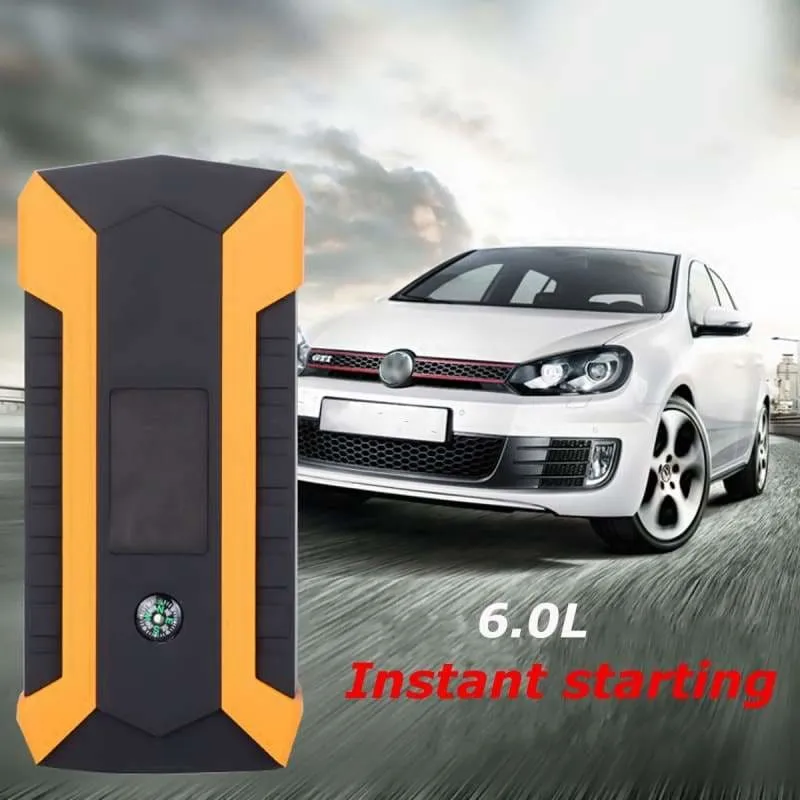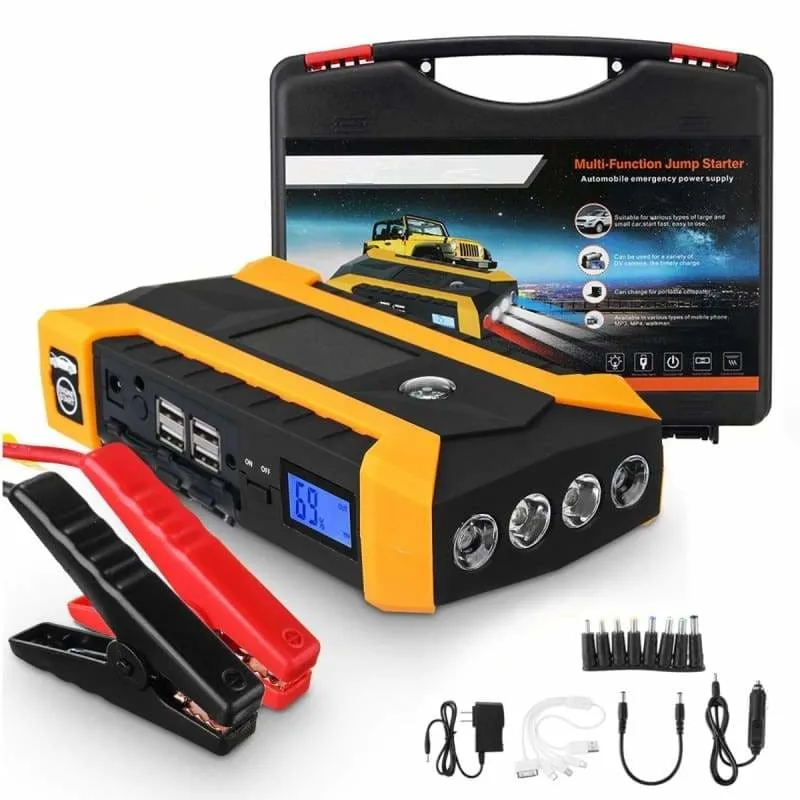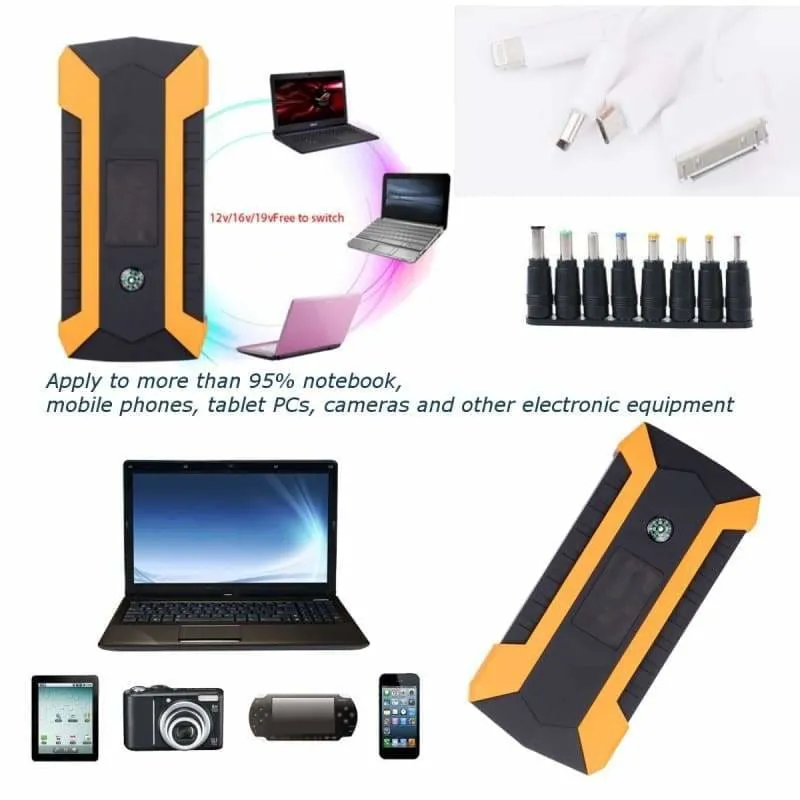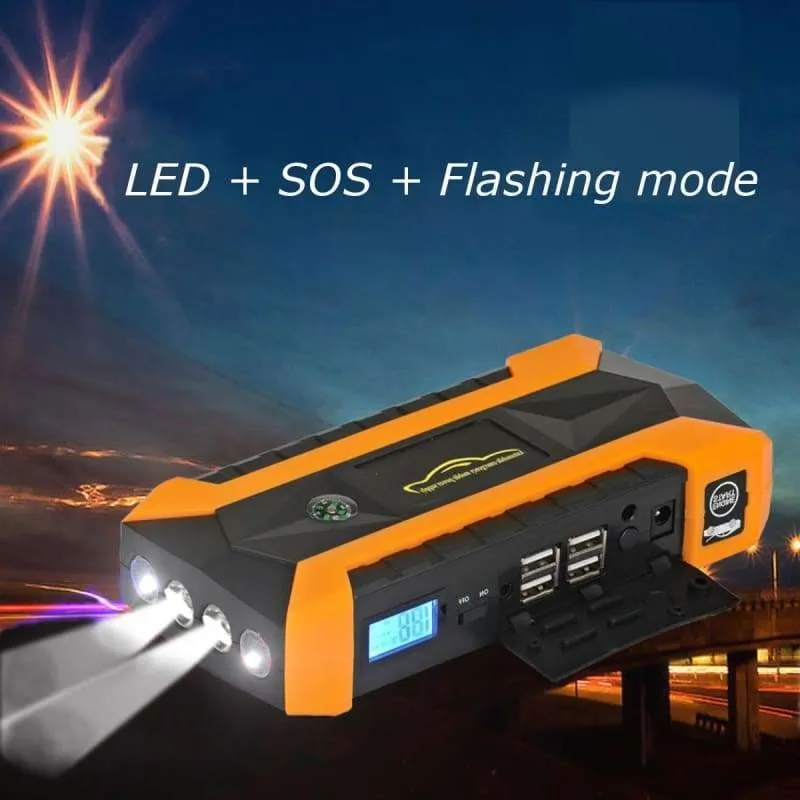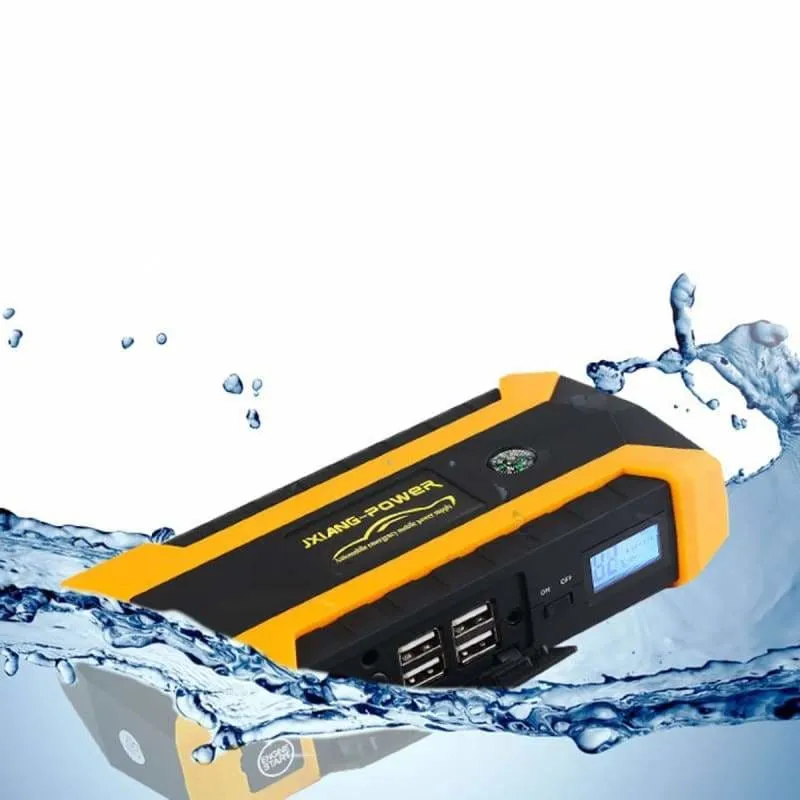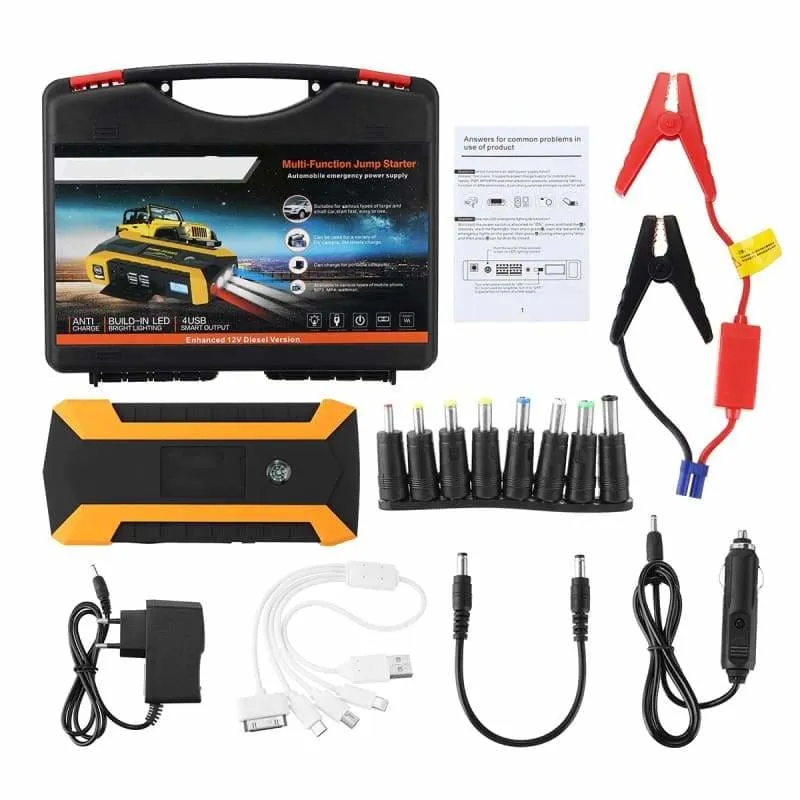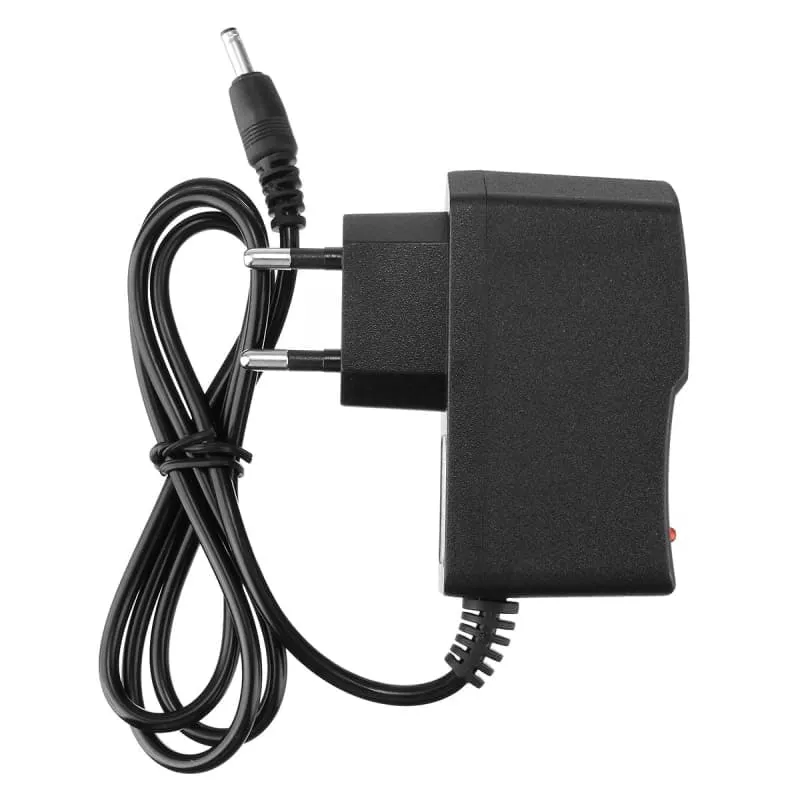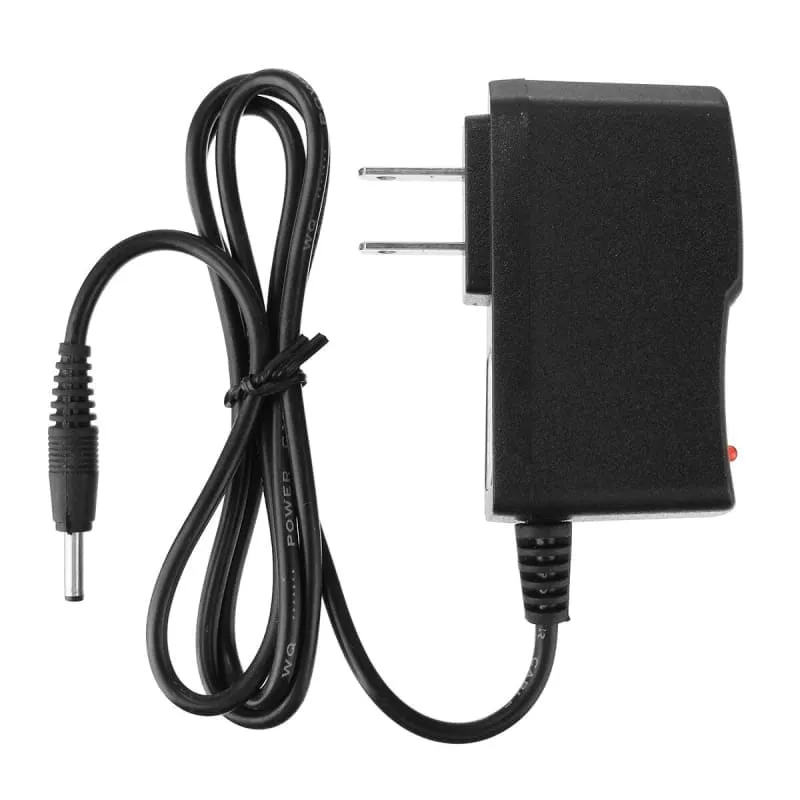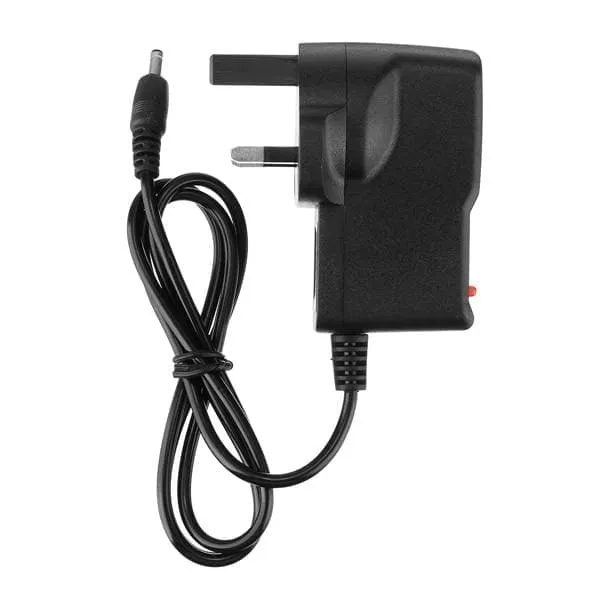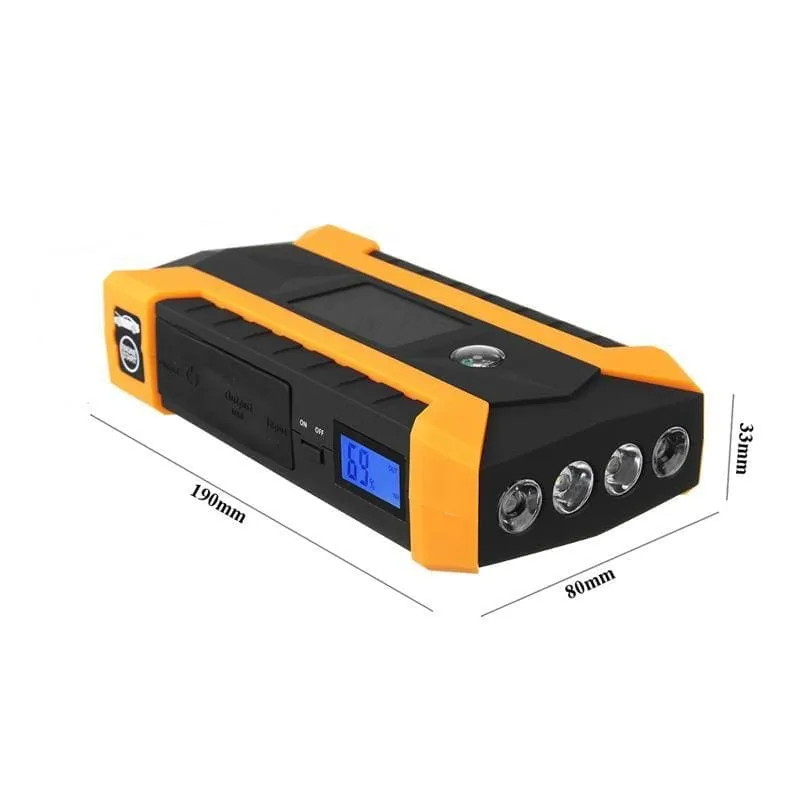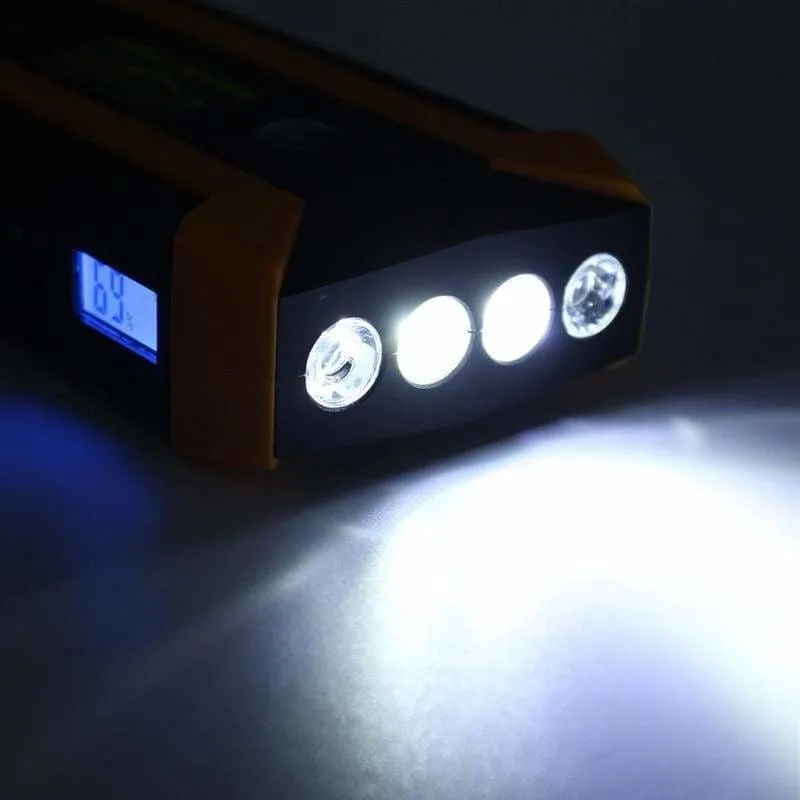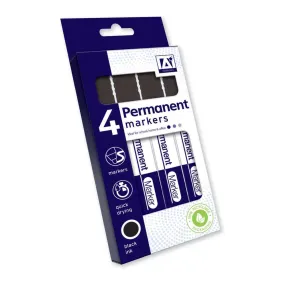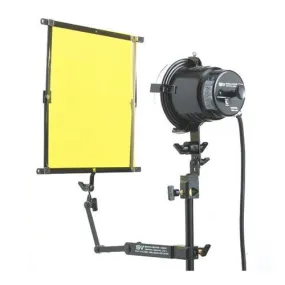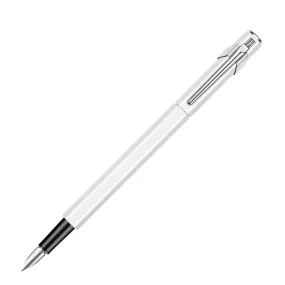🔥🔥 93% OF CUSTOMERS BUY 3 OR MORE 🔥🔥
Portable Jump Starter !!!
The SafeStart Portable Car Starter is a quick start portable emergency power bank can be used for to jump-start your car while you're at home, camping, fishing, hiking or even to recharge your phone or tablet devices.
It's the ideal device to have in your car for emergencies and especially when going out for long road trips. This sturdy power bank, a LED flashlight, and a car jump starter allows for you to easily deal with all kinds of emergencies. It features a powerful 12,000 mAh battery with 600 amp peak output, meaning it can jump-start your car several times in a single charge and can keep your phone and tablet charged for hours.
It also contains an emergency flashlight with adjustable SOS for emergency situations.
In addition to your car, you can use it to jump start your motorbike, lawn mower, boat, and most other devices that rely on a battery to operate. It weighs only 230 grams which makes it suitable to carry in your bag or your car.
The SafeStart Portable Car Starter allows for you to easily deal with all kinds of emergencies as they arise.
Tips: For the first time, you are advised to charge and discharge the electricity first.
1.Battery life has a shelf life, no matter if you use it or not, it is recommended to charge and maintain once every two months.
2.When not in use for a long time, please keep the power supply 3 or 50% or more, and charge the battery at least once in two months to maintain the battery.
3.Check if the battery Clamps are clamped to the battery connector when starting the car.
Package included:
1 x Car Jump Starter
1 x Power Adapter
1 x Car Charger
2 x Battery Clamps(Black Red)
1 x 4 in 1 Mobile Phone connectors
8 x Laptop connectors
1 x Laptop Adapter Cable
1 x User Manual
1 x Carrying Bag
Features:
1.The necessary compasses for mountaineering, camping and other outdoor activities
2.Waterproof and dust proof
3.The battery capacity is large, durable and safe
4.Small size, slim and easy to carry
5.Low temperature resistance, high temperature resistance
6.Providing power to the car, starting the car in a flash, simply solving the dilemma
7.No need to install, no need to set up, just use a clip to connect the car positive and negative, open the power switch, the car can start (red - positive, black - negative)
Four practical functions:
1. Instantly start the car, safety and emergency necessities
2. Efficient intelligent charging, with adapter and charging line, can be applied to more than 95% notebook,
mobile phones, tablet PCs, cameras and other electronic equipment
3. 1W super bright LED flashlight, with flash mode, can convert SOS emergency mode
4. Temperature protection, short circuit protection, constant voltage protection, constant current protection,
over charge protection, over discharge protection, balance protection, magnetic field protection
Description:
- Capacity: 89800 mAh
- Host weight:<445g
- Set weight:<1.2kg
- Service temperature:-20℃-60℃
- USB output: 5V---2A
- Laptop output: 12V-16V-19V
- Input current: 15V/1A
- Three light mode:LED torch,Red and blue lights,SOS,LED explosion-flashing
- Cycle life: 3000 times
- Size mm:170*80*30
- Applicable vehicle type:Gasoline car 6.0,Diesel engined car 4.0
- Starting current: 300A
- for Peak current :600A
Note:
1.When charging the jump starter, please turn the button to ON position,make it become power on state.
2.The middle two are white lights,and the next two are red and blue light. 4 LED lamp operation steps:
Switch to the ON position,Long press the round button, the middle two LED will be on;Long Press the round button again,the two LED will be off.Double clicking the round button, SOS red and blue lights will be on.
3.Because of the different input voltage and output voltage, actual capacity of the battery may have a difference, please understand.
OUR GUARANTEE
At Best Buy Deal , we strive to offer top and high-quality products in the world.
If you have any questions about your order, please contact us by emailing us at [email protected]
Just click the "Add To Cart" Button Below! There's very limited stock, and they will go soon!
Note: Due to High Demand Promotional Items May Take Up To 2-4 weeks for delivery.
WE SUPPORT AN AMAZING CAUSE
We're thrilled to support Nanhi Pari Foundation is a Girl Child Right Organization which works for Education, Health & Nutrition for Girl Child.
Best Buy Deal'S 7-POINT HAPPINESS CHECKLIST
1. FREE Shipping Worldwide on special offers.
2. Fast, Sure & Safe delivery.
3. Safe Payment.
4. 30 Day Money Back Guarantee.
5. Real humans on our support help-desk!
6.Tracking number for every order.
7. We use encrypted SSL certificates for 100% security.
Car Battery Q&A
Q: What is the car battery charging voltage? What voltage is required to charge it?
A: A 12V car battery can be charged over a range of voltages. It needs at least 12.9 volts to charge, but at this voltage the charge rate of an automobile battery is very slow. A car battery can be charged safely at high voltages as long as the battery is not fully charged. So alternator voltages and car battery chargers voltages can go over 15V safely, as long as the battery is monitored to make sure that it isn't overcharged. These higher voltages allow the battery to be charged faster. But if you want to leave the battery on the charger to keep it topped off, a float voltage of 13.6V to 13.8V is usually used.
Q: What is the 12V car battery voltage range as it is charging and discharging?
A: Car battery voltage will change depending on its condition. When the engine is off the battery open circuit voltage is 12.9 volts. A freshly charged battery, either by alternator or charger, can measure higher voltage than that by accumulating non-chemical charge on the plates like a capacitor, so it might have to sit for a while or be discharged a little to get to that voltage. As the battery discharges the voltage will sag down to 10 volts or lower. If the battery stays above 11.8 volts it will generally still start the vehicle.
Q: Can a car battery freeze when it gets too cold?
A: When a lead acid battery is fully charged the electrolyte is sulfuric acid with a freezing point of below -40°C. When the battery is fully discharged all the sulfate ions are consumed and the electrolyte is mostly pure water with a freezing point of zero degrees C. So it is not unusual to go out to a car that has a dead battery in the mid winter and find that the battery won't accept any charge current. It needs to warm up before it can be charged, and then it won't freeze again until it is discharged.
Q: How long does it take to recharge the battery after starting the engine?
A: Not very long. This is not too hard to estimate. Typical 12 volt car batteries are rated for cold cranking amps, and the one I use has 800 CCA. So being very very conservative lets assume that it takes 800 amps to start the car. I have three cars, 17 years old, 14 years old, and 22 years old, they all start in less than 3 seconds, but to be conservative let's assume 10 seconds. So 10 seconds times 800 amps is 8000 amp-seconds (8000 coulombs for you physicists) or 2.2 amp-hours. If the alternator is sourcing 80 amps, this will be replaced in 99 seconds.
A more accurate calculation would be 200 amps for 3 seconds, which would be replaced in less than 8 seconds.
Q: Why does driving short distances flatten my battery?
A: Well, it does a number on my battery. I have a 5 mile commute to work, and in the winter I have the headlights, the seat heater, the heater fans and pump and the rear window defroster going continuously in the morning and in the evening. Not to mention the radio blasting. And of course the battery is cold, in the bottom of the trunk, so it will charge slower. This doesn't give the battery much of a chance to charge or overcharge to de-stratify the acid with a few bubbles. In my Jaguar the windows slide down half an inch when the door opens to avoid the top seal. When the battery voltage gets low the car lets me know by not raising the windows back up when the door closes. I bought a new battery last spring, and by December the windows are giving me trouble. As the days lengthen and I don't use the headlights as much the car battery charge eventually fills up.
Q: Should I add water to the battery before or after I charge it?
A: Add the water before you charge. The charging process will create bubbles that help mix the acid. The charging process, even with a completely out of control battery charger, will not consume much water during one charge. I should also mention that modern charging systems with accurate voltage regulations will not consume any appreciable water, and of course the sealed batteries recycle their water, so you can't replace it.





